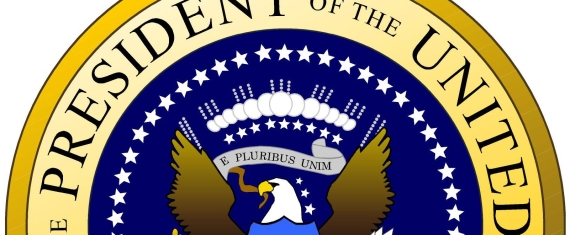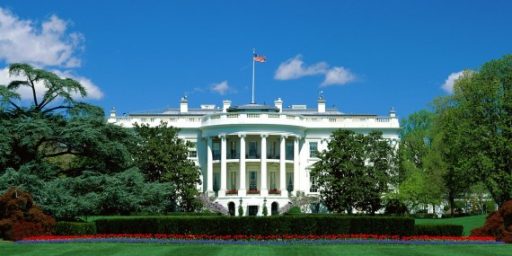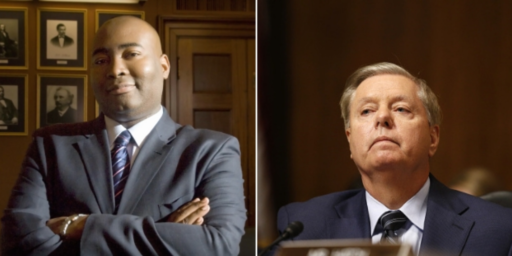Do Legislators Make Bad Presidents?
Let's see if there is evidence to support the assertion.
 It is frequently argued that legislators make bad presidents, and therefore we, as a country, are better off electing governors and vice presidents rather than senators and representatives to the White Houses. This position has emerged in a couple of recent posts here at OTB of late, the most recent being in the comment thread of one of Doug Mataconis’ posts. Indeed, Doug himself wrote in a the comments:
It is frequently argued that legislators make bad presidents, and therefore we, as a country, are better off electing governors and vice presidents rather than senators and representatives to the White Houses. This position has emerged in a couple of recent posts here at OTB of late, the most recent being in the comment thread of one of Doug Mataconis’ posts. Indeed, Doug himself wrote in a the comments:
Harding was a horrible Executive, which is typical of legislators
Emphasis mine.
Now, I have no interest in a debate over Harding, per se, but that comment itself (which was made in other posts and is a fairly common assertion) got me to thinking: to what degree is this actually true? My initial thought was that this notion is popular at the moment because the current president was a Senator before becoming president, and ergo that can be used to explain his behavior. Still, I really do have to wonder as to the degree to which it is empirically true that legislators make bad executives (although one supposed someone has studied the question). We do know, as a side note, that legislators have been known to make extremely effective executive in parliamentary systems, given that by definition all executives in such systems are members of the legislature. Examples of effective executives of this type with whom American readers would likely be quite familiar: Margaret Thatcher and Tony Blair, as well as any Israeli or German PM one would care to name.
But, one could retort, those systems are rather different than the US’s separation of powers scheme. Fair enough for the sake of discussion, so let’s look at the US presidency.
To return the bolded portion of Doug’s quote from above, we are left with two basic questions:
1) What constitutes a “horrible executive” (or even a “bad” one), and
2) What constitutes a “legislator”?
The first can be a rather subjective (or, at, least start fights). Still, if we look at a large number of rankings and aggregate the scores, we can get a pretty good idea about expert consensus on such rankings. Luckily, Wikipedia (yes, I know) did the leg work on this and compiled responses from 17 different polls (although not all cover all presidents). It is an imperfect tool, but it is sufficient for this conversation (and better than just one person’s gut reactions). I have included the aggregated ranking in the table below. Note: more recent presidents are not included in all surveys and Obama has only been in one. This factor, plus the fact that he has yet to serve out his term makes his ranking the least useful (indeed, the ranking for Obama should be ignored for the most part given these factors) but I have included it nevertheless).
The second issue is interesting: are we talking about presidents who only served in legislatures? Are we talking about ones whose last political job was in the legislature? What if the politician has both executive and legislative experience? Does having executive experience negate (if you will) the alleged ill effects of legislative experience?
I have gone through the basic bios of the 43 men who have served as President of the United States and have noted their basic career path information as it pertain to this question.
I have coded each with Executive, Legislative and Other experience. The bolded letter is the type of position held prior to being in the White House.
Executive experience is coded as VP (Vice President), G (Governor), and O (Other Executive, e.g., cabinet level service or ambassadorial position).
Legislative experience is coded as S (Senator), HR (US Representative), SL (State Legislature), CC (Continental Congress) and PC (Philadelphia Convention)
Other experience is coded as M (Military) or J (Judicial)
We can break this down in various ways.
There are a limited number of presidents who had narrow experience (i.e., only exec or only legislative). Indeed, there are only 16 total, with 10 having only executive experience and six having only legislative experience. As such, we do not have a lot of observations to work with.
Executive only (N=10)
Arthur, Cleveland, Roosevelt (T), Wilson, Coolidge, Hoover, Roosevelt (FD), Reagan, Clinton, Bush (GW)
The rankings for these presidents are as follows: 28, 19, 5, 6, 31, 29, 2, 17, 30, 34 (which is mixed bag at best).
Legislative only (N=6)
Pierce, Lincoln, Garfield, Harrison (B), Kennedy, Obama
The aggregate rankings for these presidents are: 40, 1, 29, 33, 11 and incomplete.* While, on balance not a spectacular showing, the presence of the consensus #1 on the list, as well as another just out of the top 10 makes it difficult to make the argument that we have much of a pattern here.
The average ranking for exec only is 20.1 and the average ranking for legis only is 19.0. As such, if we are going to base a conclusion on this small sample we can conclude that either a) background doesn’t really matter or b) executive only is worse than legislative only.
Other ways to break down the numbers are as follows, which looks at what the most recent position held by the president in question before assuming office.
President who came directly from VP (N=12)
Adams (J), Jefferson, Van Buren, Tyler, Filmore, Johnson, Arthur, Truman, Johnson, Nixon, Ford, Bush (GHW)
Average ranking: 23.67
Presidents who came directly from Governorship (N=13)
Polk, Hayes, Cleveland, McKinley, Taft, Wilson, Coolidge, Roosevelt (T), Roosevelt (FD), Carter, Reagan, Clinton, Bush (GW)
Average ranking: 19.08
President who came directly from Other Executive, Other Legislative or Other (N=7)
Washington, Madison, Monroe, Adams (JQ), Harrison (WH), Buchanan, Hoover
Average ranking: 16.86
Presidents who came directly from the military (N=3)
Taylor, Grant, Eisenhower
Average ranking: 26.67
Presidents who came directly from Senate (N=6)
Jackson, Pierce, Harrison (B), Harding, Kennedy, Obama
Average ranking: 27.0 (excluding Obama)
Presidents who came directly from the House of Representatives (N=2)
Lincoln, Garfield
Average ranking: 15.0
I think that a clear pattern is extremely hard to ascertain, to be honest. And, of course, more sophisticated analysis could be done on this topic. Indeed, basing these rankings solely on sequence of career is problematic, even if it does fit the general public narrative on the question at hand.
Granted, based on the limited of observations, we do see that the poorest performing sub-group are those that came directly from the Senate (with an average similar to those for president who came straight from the military) and yet at the same time, the best performing group is the House group, but given that N=2 and one of the N in question is ranked #1 overall, this skews that result. Interestingly, one of the higher performing groups is the “Other” category.
One last thing along these lines that struck as worth noting. In Doug’s post he noted a proposal from Glenn Reynolds (made back in 2005):
My own proposal for reform would be a bit different: Make anyone who serves in the Senate ineligible to run for President. That wouldn’t be much of a loss, really — Senators do very badly in the Presidential election business anyway.
First, I am not sure what problem this is supposed to solve.
Second, if that rule were in effect, the following persons would never have been president: Monroe, Adams (JQ), Jackson, Van Buren, Harrison (WH), Pierce, Buchanan, Johnson (A), Harrison (B), Harding, Kennedy, Johnson (LB), Nixon, and Obama.
While one may have gripes with any number of the above-listed individuals, I am not sure why they, as a class unique from others, constitute an argument for a blanket rule to forbid Senators from seeking the White House. Further, such a proposal ignores the simple fact that if being a Senator forestalled one from running for the presidency, then that would simply mean that a lot of politicians simply would not pursue a senate seat. As one changes rules, one changes behavior.
In conclusion, I would argue that an actual examination of the career paths of presidents provide no compelling evidence to suggest that a specific experience with executive or legislative office equates to explaining the quality of a given presidency.
—-
*Obama is 14th in the table, but that is based on one survey and less than two years in office. As such, he really deserves a incomplete.






The problem isn’t with legislators per se. The problem that will surely lead to a terrible presidency is specifically an Illinois lawyer who had served just eight years in the state legislature and two years in Congress before launching his presidential bid. I’m referring, of course, to Mr. Lincoln.
One overlooked qualication is patents. All Presidents who held patents kicked @$$.
A few points worth considering.
First, I think it’s probably worthwhile to distinguish between elected Executive experience and appointed Executive experience. it’s been quite some time since a President has going directly from the Cabinet to the Presidency, although that was rather common during the earlier years of the Republic. Until Obama, every President since Johnson had held an elected Executive position (either Governor or Vice-President).
Second, given the extend to which the nature of the Presidency has changed since Presidents like TR, Wilson, FDR transformed it, I’m not sure that 19th Century experience tells us much about what kind of political experiences is most helpful to being a President in the 21st Century.
Third, I think ranking Barack Obama at 14th among the 44 people who have served as President is generous to say the least. But that’s just a reflection of the fact that ranking current and recent Presidents in this manner is usually biased by the political attitudes of the time
@Doug Mataconis:
In regards to your first point, I mostly disagree. While I understand that appointed and elected office are quite different, if the issue at hand is one of the types of skills one acquires prior to serving as president, then I think one has to take into consideration appointed positions. There are key executive skills to be learned in doing something like running the State Department, or even a major embassy.
In regards to the second point, I an see the argument, but of course, if we do that we cut our observations in half, which makes it even harder to makes claims like “legislators make bad presidents.”
Agreed on the third point, which is why I did not include him in the actual calculations.
There’s also the head-to-head aspect, of cmparing just who was running against who in any given election. I assembled this table about seven years ago:
1932: Governor Roosevelt defeats President Hoover
1936: President Roosevelt defeats Governor Landon
1940: President Roosevelt defeats private executive Wilkie
1944: President Roosevelt defeats Governor Dewey
1948: President Truman defeats Governor Dewey
1952: War hero General Eisenhower defeats Governor Stevenson
1956: President Eisenhower defeats Governor Stevenson
1960: Senator Kennedy defeats Vice-President Nixon
1964: President Johnson defeats Senator Goldwater
1968: (former) Vice-President Nixon defeats Vice-President Humphrey
1972: President Nixon defeats Senator McGovern
1976: Governor Carter defeats President Ford
1980: Governor Reagan defeats President Carter
1984: President Reagan defeats (former) Vice-President Mondale
1988: Vice-President Bush defeats Governor Dukakis
1992: Governor Clinton defeats President Bush
1996: President Clinton defeats Senator Dole
2000: Governor Bush defeats Vice-President Gore
Add in:
2004: President Bush defeats Senator Kerry
2008: Senator Obama defeats Senator McCain
Your discussion is good in the absolute sense, but this is politics — there’s always the relative element. We should keep in mind “who was the alternative?”
J.
@Jay Tea:
All well and good, but the research question at hand was “do legislators make bad presidents” and answering that question has nothing to do with whom the defeated candidate was in a given election.
I’m going to have to go ahead an agree with Professor Taylor’s main point which is that there’s certainly no strong statistical pattern here and probably not even a weak one. Doug’s arrogance that his current judgment of Obama is more accurate than how history will view him is coloring every post he makes on the subject.
@Doug Mataconis: ” Until Obama, every President since Johnson had held an elected Executive position (either Governor or Vice-President).”
With all due respect, Americans do not elect Vice-Presidents. Vice-Presidents are NAMED (appointed) to their positions and are elected only when we elect “the top of the ticket.”
As such is the case, there is no difference between VPs and other “appointed” executives.
Does that factor change “the importance” of considering the “difference?”
As your coding decisions and the ensuing discussion makes clear, this is almost a fruitless exercise.
– Only 43 men have held the office
– There’s wild disagreement as to how effective most of them were
– The office has changed substantially over time, making comparison much more difficult
– Presidents get too much credit/blame for circumstances outside their control. Inherit a horrendous economy and not a world war? Horrible! Inherit peace and have a fortuitous economic boom? Outstanding! Bonus points if WWII or the Civil War occurred under your watch or you helped found the country.
These rankings are crazy: Carter and Hoover ahead of Nixon? Wilson # 6? Clinton # 30?
No way. These numbers show that the whole thing is faulty.
But as we certainly saw in 2008, the second person on the ticket will definitely have an affect on how people vote, as such neither President nor Vice President can be considered to be independently elected anymore, but both should be considered dependently elected.
@Just nutha ig’rant cracker: Well, actually veeps are technically elected by the EC.
Granted, for all practical purposes they are add-ons the the presidential candidates and people do not directly vote for them.